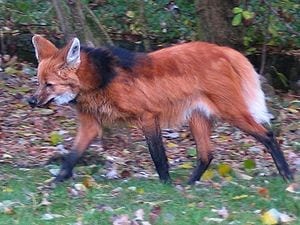If scientists in Brazil have their way, the populations of eight endangered species could soon expand through a mass effort to clone them.
The project is spearheaded by the Brasilia Zoological Garden in partnership withEmbrapa, the Brazilian government’s agricultural research agency.
The scientists have already spent the past two years collecting 420 genetic samples for the species—mostly from dead specimens found in the Cerrado savanna region—and are now waiting for legal authorization to start the cloning. If they receive government approval, the species they’ll be working with would include the maned wolf (Chrysocyon brachyurus); jaguar (Panthera onca); black lion tamarin (Leontopithecus chrysopygus); bush dog (Speothos venaticus); Brazilian aardvark, also known locally as coati (Nasua nasua); collared anteater (Tamandua tetradactyla); gray brocket deer (Mazama gouazoubira); and bison (Bison bison). Bison are not native to Brazil, although the rest of the species all have some of their primary habitats within the country’s borders. The black lion tamarin, the most endangered of the eight species, is the only one that lives exclusively in Brazil.
Cloning and similar techniques have been attempted with endangered species before, with varying degrees of success. A 2011 effort to breedAfrican black-footed cats (Felis nigripes) in the U.S. was successful, although it wasn’t technically cloning. A 2009 attempt to clone the extinct Pyrenean ibex (Capra pyrenaica pyrenaica) in Spain didn’t work out as well: the resulting kid only survived for seven minutes after birth.
If the Brazilian cloning effort is successful, the animals would all be carbon copies of each other and therefore not useful for maintaining genetically varied populations—such diversity is key to a population’s resilience in the face of various diseases and predatory threats. Instead, the cloned animals would live at the zoological garden. “The idea is to keep these animals in captivity,” Embrapa researcher Carlos Frederico Martins told the Inter Press Service. “The use of clones would prevent the impact caused by the removal of [wild] animals from their natural setting.” He says Embrapa was the first organization to clone animals in Brazil and its researchers have already successfully cloned domesticated cows (a fairly common practice around the world). Now, they hope to apply what has been learned to the eight endangered species.
via Scientific American – John R. Platt
The Latest Streaming News: Cloning Endangered Species updated minute-by-minute
Bookmark this page and come back often
Latest NEWS
Latest VIDEO








